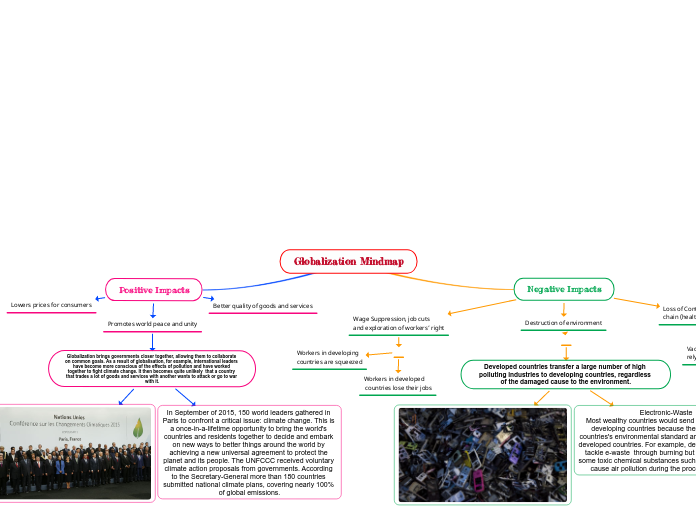Globalization Mindmap
Negative Impacts
Wage Suppression, job cuts
and exploration of workers’ right
Workers in developing
countries are squeezed
Workers in developed
countries lose their jobs
Destruction of environment
Developed countries transfer a large number of high polluting industries to developing countries, regardless of the damaged cause to the environment.
Electronic-Waste
Most wealthy countries would send their e-waste to developing countries because these developing countries's environmental standard are more relax than developed countries. For example, developing countries tackle e-waste through burning but it would release some toxic chemical substances such as mercury which cause air pollution during the process of burning.
Loss of Control over supply
chain (health, food)
Vaccine (For example, Federal Government
rely on U.S. sending vaccine to Canada)
Positive Impacts
Lowers prices for consumers
Better quality of goods and services
Promotes world peace and unity
Globalization brings governments closer together, allowing them to collaborate on common goals. As a result of globalisation, for example, international leaders have become more conscious of the effects of pollution and have worked together to fight climate change. It then becomes quite unlikely that a country that trades a lot of goods and services with another wants to attack or go to war with it.
In September of 2015, 150 world leaders gathered in Paris to confront a critical issue: climate change. This is a once-in-a-lifetime opportunity to bring the world's countries and residents together to decide and embark on new ways to better things around the world by achieving a new universal agreement to protect the planet and its people. The UNFCCC received voluntary climate action proposals from governments. According to the Secretary-General more than 180 countries submitted national climate plans, covering nearly 100% of global emissions.
